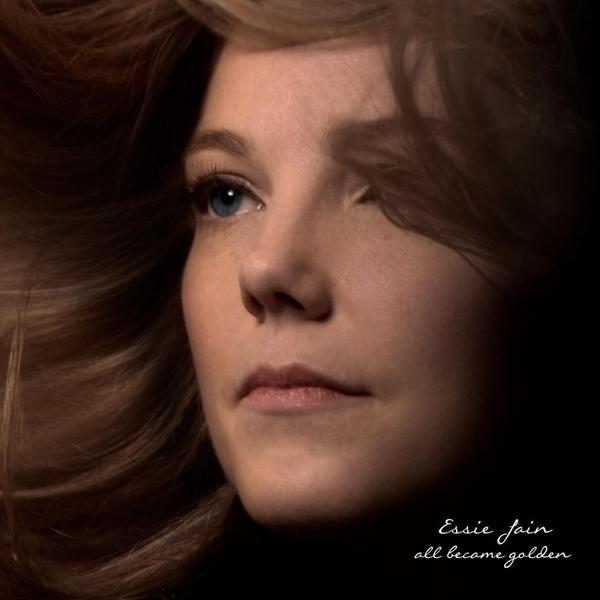All Became Golden isn’t just another album from British singer/songwriter Essie Jain. Nor is it just an audio visual album, combining the talents of Jain, composer Nico Muhly, and filmmaker Nathalie Johns. It’s more than that, and what it is stems from is the disillusionment Jain found herself overwhelmed with after the release of her 2011 album Until The Light of Morning. “If I did put my hands to the keys, it just seemed [like] this impossible, overwhelming task,” she explains during the film version of Golden. Thankfully Johns rekindled her interest after proposing a new approach to her music, filming it live, in a manner that resembles how Frank Sinatra used to record, with an orchestra and conductor there beside him. “I knew if I played music again it would have to be something spectacular,” Jain goes onto explain in the interview, and All Became Golden is little short of being just that.
The music on Golden is undoubtedly that of Jain: the tracks are graceful and deliberate for the most part but without sounding too fussy or precocious. When “No Mistake” quietly sweeps into view with acoustic guitars strums and homely strings, Jain follows suit and sounds like she’s continuing on from her underrated 2008 album The Inbetween. Lyrics have never been a consistently strong feature, but she chooses most of her words carefully so that they suit her voice; she wraps her voice around a phrase or a word, embracing it so it leaves a warm impression. On “I” she comforts the phrase “I cried over and over,” like a mother reassuring a weeping child while on “Stand In The Light” has her skipping between her notes as woodwind flutters about beside her. Sounding at least a decade older than it is, Jain’s voice is a vastly intriguing alto that always felt like an instrument in itself, played with nuance, control, and temperament.
With an orchestra beside her, though, it becomes one with her accompaniments. She falls into the lush backdrop until she’s creating a buoyant vessel to drift across on. On “My Darling” she swells gracefully like a rising light during the song’s instrumental sections whereas on “Raise You” she fades away to a hum as the orchestra fades and slows to a stop. Muhly is to be paid due credit for his stellar work here. Jain has always had sturdy arrangements, but he finds a new grace for her tracks. Granted, having the orchestra at hand can only but help create this, but he sounds like he’s found a very refined and particular aspect of what Jain has to offer, and fine tunes it across nine tracks. “I really liked the idea of doing it live in front of cameras, because you can see there’s no trick to making music like this happen,” Muhly said of the project. He’s right to say so; Golden captures a seamlessness that is hard to fully appreciate with your ears alone. At the very least, the film of Golden helps you appreciate the nuance and the detail of the arrangements, or just sheds a little more light on the players on the album.
One of the glorious strengths of Golden is its power to evoke. Jain namedrops the likes of Nina Simone as inspiration, but her influence seems to reach further. “Dark Is The Night” sounds like her very own “King of Carrot Flowers” with ticking acoustic guitar while “No Mistake” sweeps across the floor gracefully, like a half-remembered waltz from the past. It’s the album’s centrepiece and lead single “Raise You” that stands the highest here, delivering Jain’s most impassioned performance as strings build and build. Strangely enough, the point of comparison I keep coming back to is Scott Walker’s grand and inimitable “Farmer In The City.” It’s not as overwhelming, but the effect Muhly creates as everything swells is noticeably similar, and it’s a wonderful moment captured, and perhaps both Jain’s most instantly and lastingly impressionable track to date.
If Golden has any failings, it’s when it falls into a desire to strip away the scope. Jain’s cover of Dire Straits’ “Why Worry” matches the surrounding material musically, but it stands out too much lyrically, having her sounding elementary. “Why worry? There should be laughter after pain/ There should sunshine after rain” goes the chorus, and it makes it clear that not all of Knopfler’s lyrics age well. At least when Jain’s own songs lean too closely too similar lyrical blandness, like on “My Darling,” she has a wistful and glorious swell to distract from it, if not elevate it to another level.
But any misgivings to be brought up against the album are likely to be overshadowed with the fact that it’s brilliant we once again have Jain back making music, re-inspired and renewed with an album that makes her sound better than ever. Granted, some of the intimacy of her previous albums is lost here, but like Jain said, Golden always had to be something spectacular for her to be driven to get involved. We owe it to Johns for giving Jain something impossible to say no to, and to Muhly for casting Jain so well, but without a doubt the brightest light of gratitude has to go to Jain herself for choosing to return and doing to with such grace and artistry. It’s hard not to believe that everything has indeed become golden – it certainly sounds like it here.

